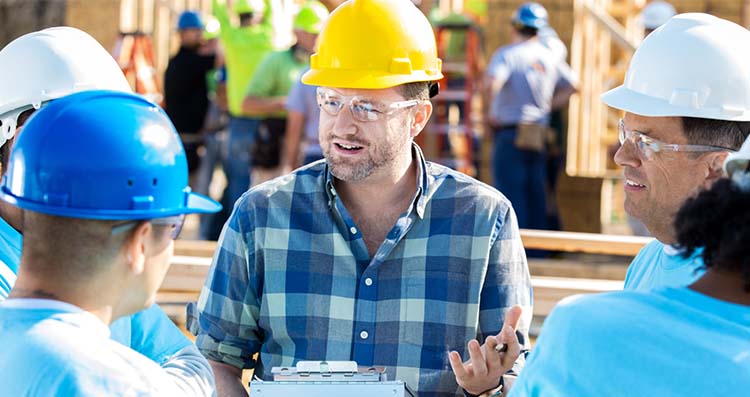Who needs to carry out basic safety training on a temporary or mobile construction site?
Are you a contractor for a temporary or mobile construction site? If so, you are legally obliged to have employees undergo basic safety training. This obligation applies to everyone who contributes to the concrete realisation of a structure at the workplace. You can read all about it below!
The basic safety training must inform all workers on a temporary or mobile construction site of the risks arising from their own activities and others in their vicinity. A basic knowledge of legal prevention principles, safe behaviour on a construction site, and applying appropriate prevention measures form part of the learning package.
Basic safety training shall be repeated at regular intervals, unless the employer can demonstrate that workers' knowledge remains current, through regular or continuous training and information, and through practical experience.
Do you employ someone new? Then, ideally, they will take the training before starting work. If not, then within a month of start-up.

For whom is the training mandatory?
Basic safety training is mandatory in some sectors:
- All construction workers (PC 124)
- Other joint committees active on site (111, 145 and PC 149.01)
- Belgian self-employed persons
- All agency employees and self-employed persons, unless they already have a valid certificate from another EU Member State.
A number of categories or functions are in a grey area, according to umbrella construction association Embuild. This includes, for example, working students, trainees or dual-learning students. If they perform work on a temporary or mobile construction site (TMB) that contributes to the realisation of the construction work, they are also eligible to undergo basic safety training.
In a strict sense, it is not compulsory for students as part of a spectator placement, but certainly recommended given their age and lack of experience.
Drivers delivering construction materials, drivers of concrete mixers and operators of concrete pumps are also covered by the training obligation.
Project and site managers or representatives do not qualify, insofar as they do not perform manual operations but rather exclusively intellectual work.
Exceptions to the rule
Not every worker has to undergo basic training. For example, construction workers can be exempted if they:
- Have a valid VCA certificate;
- Have already completed a construction safety training validated by Constructiv;
- Are in possession of a certificate obtained or validated by Constructiv showing they have followed a recognised basic safety training;
- Have gained at least five years of relevant experience in the past ten years;
- Have already followed the basic safety training for temporary workers in construction;
- Have obtained a valid certificate in another EU country.

Who checks that everyone has received the necessary training?
The basic rule is that every self-employed person is responsible for themselves and their staff. Non-compliance with the law may result in a sanction. But main contractors can also be held co-responsible (and thus be sanctioned) when subcontracting. In fact, this RD is part of the Welfare Act and will therefore be checked along with it during an inspection visit by the FPS WASO.